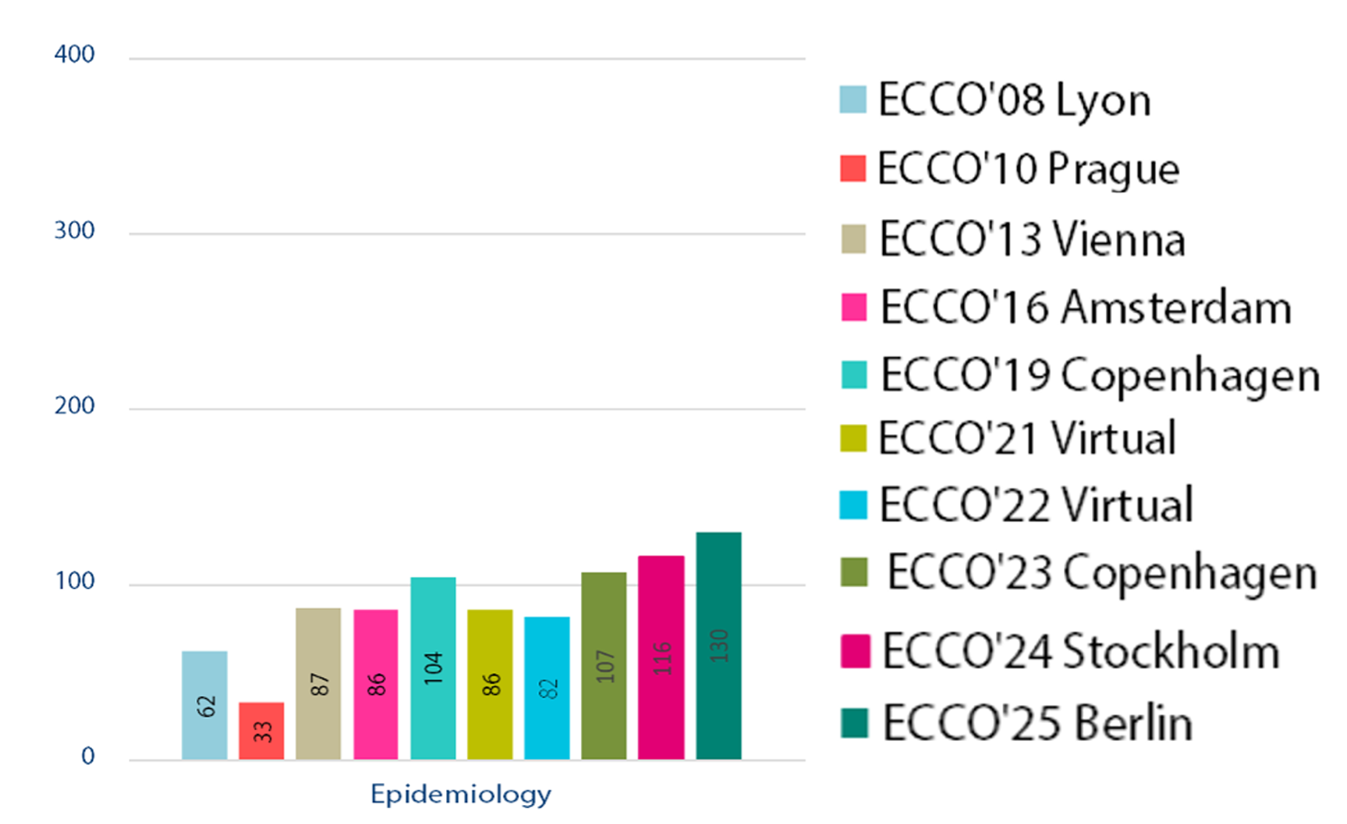Best epidemiological abstracts at ECCO’25
Brigida Barberio, EpiCom Member
|
Brigida Barberio |
A total of 130 abstracts focused on epidemiology were selected for presentation at the 2025 ECCO Congress, the highest number submitted in this category in recent years.
This growth underscores the importance that ECCO Members and IBD researchers place on epidemiology in deepening our understanding of IBD aetiology, management and outcomes. In this article, we spotlight some of the most noteworthy abstracts that stood out to us during the recent ECCO Congress in Berlin (see graph).

Burish et al. (DOP037, The V-Sync study: Validation of the synchronization of the ENEIDA and UR-CARE registry): The V-SYNC study aims to validate the synchronisation between the ENEIDA [1] and UR-CARE [2] databases, enhancing data integration for IBD research and clinical practice. By comparing 100 patient datasets [50 Crohn’s Disease (CD), 50 Ulcerative Colitis (UC)], key variables such as demographics, diagnosis, treatment history and outcomes will be analysed for consistency. Validation metrics will assess data integrity, while usability tests will confirm effective data retrieval. Additionally, ten quality-of-care queries will ensure alignment across both registries. Data validation is expected to be completed by 2024. If successful, this study will establish a model for future database harmonisation in IBD research.
Palomino et al. (DOP038, Impact of prenatal and breastfeeding exposure to biologic drugs on the first-year anthropometric development of infants born to mothers with inflammatory bowel disease from DUMBO registry of GETECCU): This study analysed the impact of biologic drug exposure during pregnancy and breastfeeding on infant growth and malnutrition risk in children born to mothers with IBD. Data from 352 infants in the DUMBO [3] registry were assessed at birth and at 3, 6, 9 and 12 months. No significant differences were found in growth between exposed and non-exposed infants. However, non-exposed infants had a higher risk of malnutrition at 1 and 3 months. These findings suggest that biologic therapies during pregnancy and breastfeeding are safe and may even support improved growth early in life by improving maternal control of the underlying inflammatory process.
Dan et al. (DOP039, Dietary methyl group donor intake alleviates the susceptibility to inflammatory bowel disease influenced by environmental pollution in a prospective cohort study): This study investigated the impact of dietary methyl group donors (MGDs) on IBD risk, particularly in individuals exposed to smoking and air pollution. Analysing data from 186,195 participants in the UK Biobank over 10.8 years, higher MGD intake was associated with a reduced risk of CD and UC. The protective effect was stronger in smokers and those with high air pollution exposure. These findings highlight the potential role of dietary MGDs in preventing IBD and suggest targeted nutritional strategies for at-risk populations.
Chen et al (DOP040, Plant-based diets mitigate incidence, disease course and comorbidity of inflammatory bowel disease: evidence across eight European countries): This study examined the impact of plant-based diets on IBD risk and progression using data from the UK Biobank (187,888 participants) and the EPIC cohort (341,539 individuals). A higher adherence to a healthy plant-based diet was linked to a lower risk of IBD, while an unhealthy plant-based diet increased the risk. Similar associations were found for CD and UC, and an unhealthy plant-based diet was associated with higher surgery risk in IBD patients. Mediation analysis suggested these effects were influenced by inflammation and genetic risk. These findings highlight the need for specialised dietary guidance in IBD management.
With the growing recognition of epidemiology's role in advancing IBD research and care, we encourage researchers to start shaping their own epidemiological studies for submission to ECCO'26—an opportunity to contribute valuable insights to this rapidly evolving field!
References
- Zabana Y, Panés J, Nos P, et al.; en representación de GETECCU. The ENEIDA registry (Nationwide study on genetic and environmental determinants of inflammatory bowel disease) by GETECCU: Design, monitoring and functions. Gastroenterol Hepatol 2020;43:551–8. English, Spanish. doi: 10.1016/j.gastrohep.2020.05.007.
- Burisch J, Gisbert JP, Siegmund B, et al. Validation of the 'United Registries for Clinical Assessment and Research' [UR-CARE], a European Online Registry for Clinical Care and Research in Inflammatory Bowel Disease. J Crohns Colitis 2018;12:532–7. doi: 10.1093/ecco-jcc/jjy015./li>
- Chaparro M, Donday MG, Abad-Santos F, et al. The safety of drugs for inflammatory bowel disease during pregnancy and breastfeeding: the DUMBO registry study protocol of GETECCU. Therap Adv Gastroenterol 2021;14:17562848211018097. doi: 10.1177/17562848211018097.



